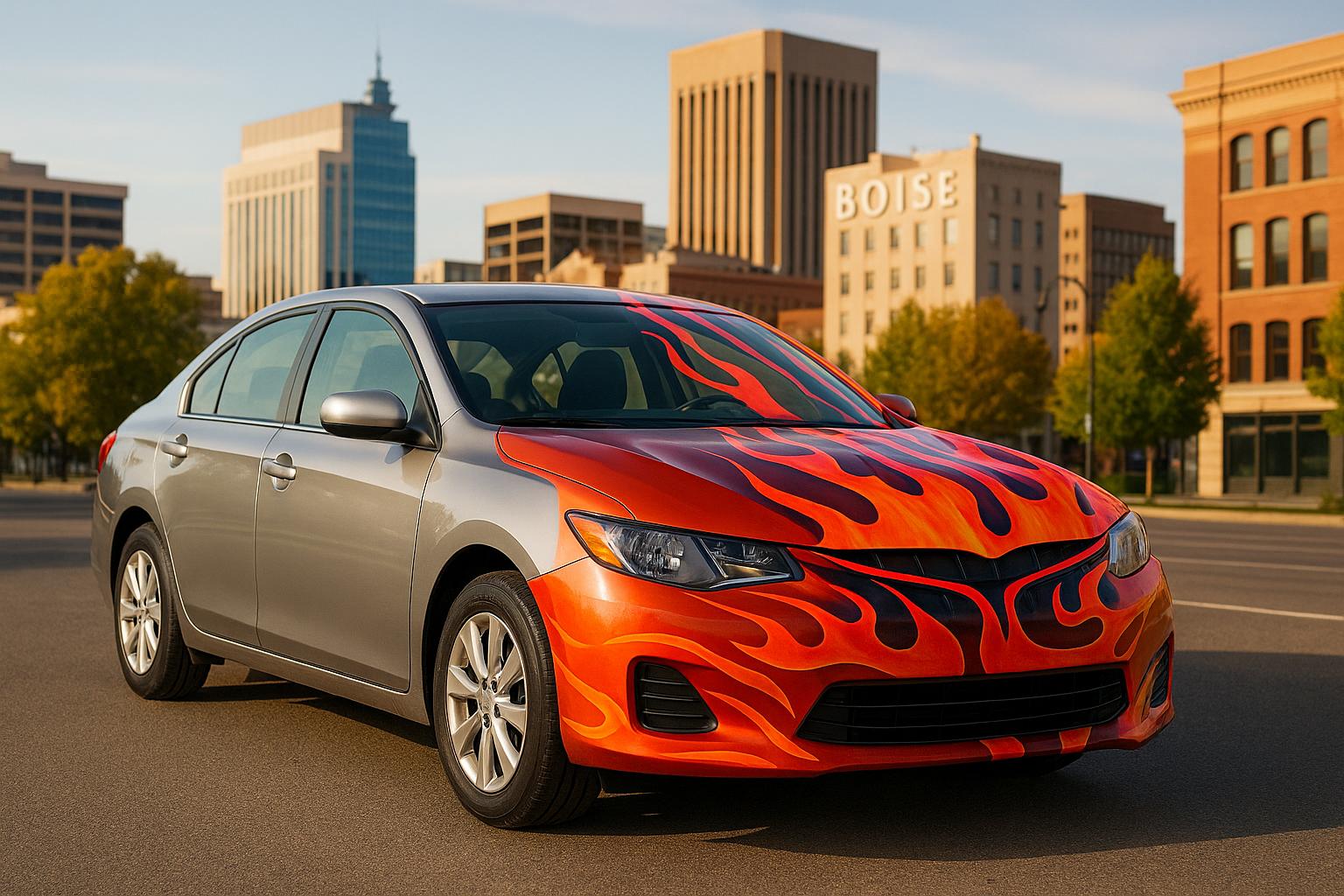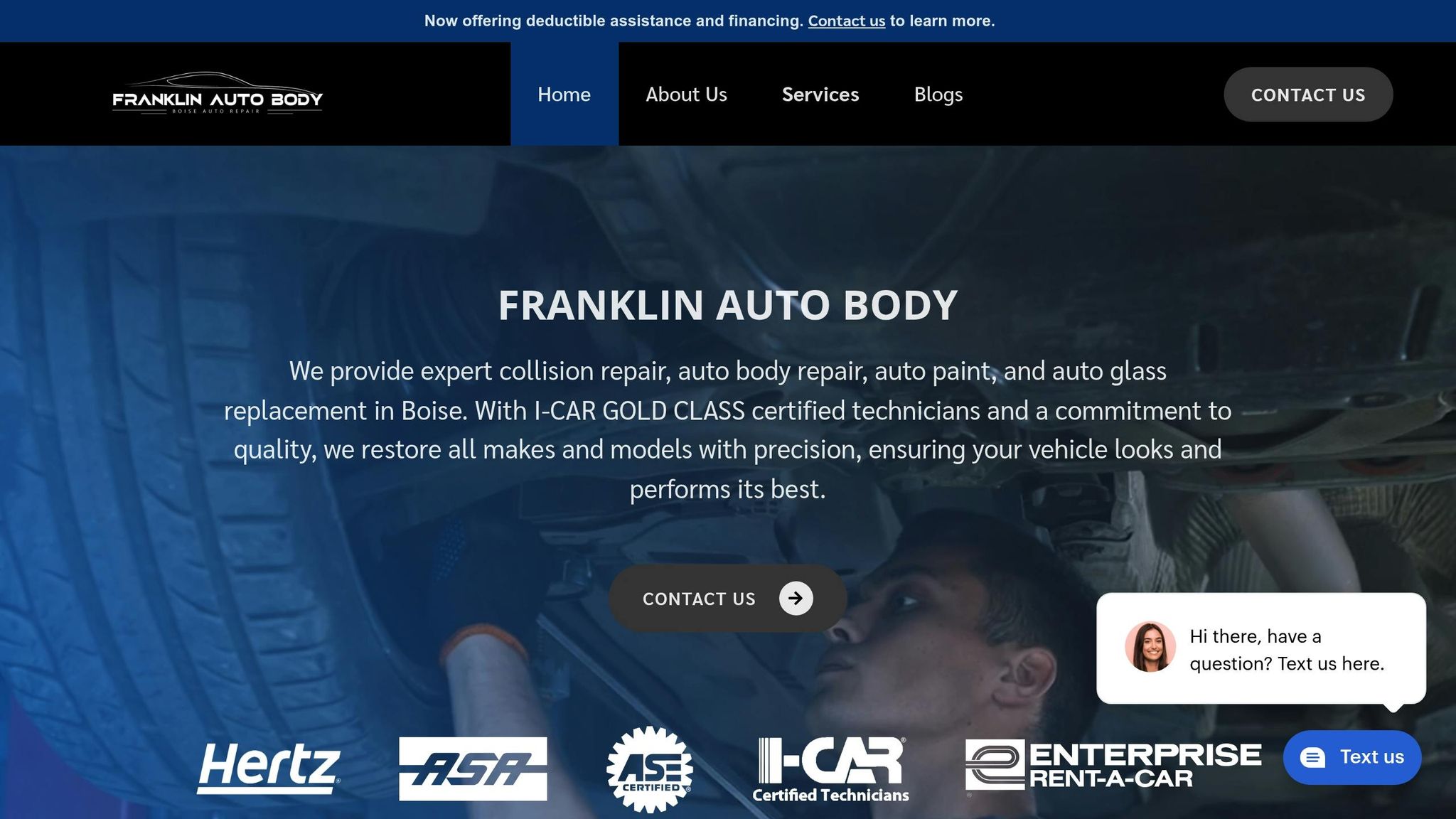August 25, 2025

When deciding how to repaint your car in Boise, you generally have two main options:
Key Factors to Consider:
Quick Comparison:
Your choice depends on your goals, budget, and how much maintenance you're willing to handle. Factory matching is practical for repairs, while custom paint is great for a standout look. Franklin Auto Body in Boise offers both options with expert technicians to guide you through the process.
Factory color matching is all about recreating your car’s original paint color based on the specifications set by the manufacturer. It’s the go-to method for restoring your vehicle’s original look with precision.
The process starts with your car’s paint code - a unique identifier assigned by the manufacturer to specify the exact color. You can usually find this code on a sticker or plate in areas like the door jamb, glove compartment, or under the hood.
Auto body shops today rely on spectrophotometry, a high-tech system that analyzes how light interacts with your car's existing paint. This technology picks up even the smallest variations in your paint, helping technicians mix a color that blends seamlessly with your vehicle’s finish.
The actual paint mixing involves combining base colors, metallics, and pearlescent elements following the Original Equipment Manufacturer (OEM) guidelines. Professional paint systems have databases filled with factory color formulas, even accounting for slight tweaks manufacturers might make from one model year to the next. This attention to detail ensures a near-perfect match.
Factory color matching does more than just make your car look good - it helps maintain its authenticity and value. A seamless color match keeps your vehicle’s resale value intact and can simplify insurance claims if repairs are needed.
Another perk? The finish is designed to meet or exceed the durability of custom paint jobs. In many cases, it may even come with a manufacturer-backed warranty, offering extra peace of mind.
While factory color matching has clear benefits, it’s not without its challenges.
For instance, environmental factors like Boise’s intense sun or seasonal weather changes can cause your car’s paint to fade over time. This fading can make it tricky to achieve a perfect match without blending techniques.
Customization is another limitation. Factory matching sticks to the original manufacturer’s color palette, which might not align with your personal style or aesthetic preferences.
Cost is also worth considering. While insurance often covers factory matching for collision repairs, repainting an entire vehicle using this method can get pricey. Factors like the size of your car and the complexity of the paint - especially metallic or pearlescent finishes - can drive up costs.
Lastly, availability can be an issue for specialty or discontinued colors. If a manufacturer no longer produces a specific color, custom mixing may be required, which can increase both the cost and the time it takes to complete the job.
Custom auto paint is a way to give your Boise vehicle a personal touch, transforming its appearance beyond the standard factory color. Whether you're making a small adjustment or going for a bold, head-turning makeover, custom paint allows you to express your style and make your vehicle truly yours.
The process starts with a consultation to bring your vision to life. From there, skilled technicians use specialized techniques to create your desired look. This might include intricate airbrushed designs, multi-color finishes, smooth gradients, or striking racing stripes. The possibilities are as varied as your imagination, offering endless ways to craft a unique finish for your car.
Custom auto paint can completely transform your vehicle's appearance, giving it a look that reflects your personality. Whether you prefer bold, eye-catching designs or subtle, elegant details, this process ensures your car stands out. For classic car enthusiasts, custom painting is also a vital part of restoration. It helps bring vintage vehicles back to life, addressing imperfections while preserving their timeless appeal and value.
While custom auto paint delivers a distinctive and personalized finish, it does come with some considerations. The specialized techniques involved often mean higher costs. Additionally, because each design is unique, future repairs or touch-ups can be tricky to match perfectly. It's important to weigh these factors and decide if a custom paint job aligns with your vision and budget.
Deciding between custom and factory-matched paint is a choice that hinges on several factors, including your vehicle's look, your budget, and how well the paint holds up over time. Let’s break it down by cost, precision, and durability to help you make the best decision.
If you're looking for a budget-friendly option, factory color matching is usually the way to go. It’s designed for standard repairs, using pre-set formulas and straightforward techniques that keep labor costs low. The process is efficient because technicians stick to established procedures without adding any custom touches.
On the other hand, custom auto paint comes with a higher price tag. Why? It often involves intricate designs, specialized materials like metallic flakes or pearl finishes, and extra time for detailed work. Plus, the artistic skill required to create a one-of-a-kind finish adds to the overall cost.
Factory color matching has a big advantage: it uses the original paint codes and formulas from the vehicle manufacturer. This means technicians can often achieve a seamless repair, even accounting for sun fading, which helps maintain the car’s resale value.
Custom paint, however, can be trickier when it comes to blending new work with the existing panels. Creating a smooth transition between a custom-painted area and the factory finish takes significant expertise. The challenge increases if the design involves multiple colors or effects like gradients. These complexities highlight the importance of considering how well the paint will perform over time, especially under local conditions.
Factory-matched paint is built to last. Over the years, it’s been rigorously tested to endure harsh conditions like extreme temperatures, UV exposure, and weather challenges - fitting for places like Idaho. The system, which includes primer, base coat, and clear coat, is engineered for durability and long-term performance.
Custom paint durability depends on the materials and techniques used. High-quality custom jobs with automotive-grade materials can rival factory paint, but some specialty finishes may need extra care. For example, metallic or pearl effects might fade faster, and matte finishes tend to show scratches and wear more easily than glossy ones.
Boise’s tough climate, with its temperature swings and road salt, puts any paint job to the test. Factory-matched paint is easier to maintain with standard automotive products, while custom finishes often require the original painter - or someone equally skilled - to handle touch-ups or repairs.
To help you weigh your options, here's a side-by-side look at how custom and factory-matched paint compare in terms of cost, precision, and process.
This table breaks down the key differences, helping you decide between the precision of factory-matched paint and the creative possibilities of custom paintwork.
For cost-conscious buyers, basic custom paint jobs can be an affordable alternative, often priced lower than factory-matched options. This is partly because custom suppliers tend to focus on a limited selection of popular colors, avoiding the higher costs associated with maintaining a vast library of factory color formulas. However, if you're aiming for a high-end, one-of-a-kind look, custom paintwork can climb well beyond $20,000.
On the other hand, factory color matching excels when it comes to seamless repairs. Advanced computer-mixed formulas take into account factors like sun fading and the vehicle's age, making it ideal for restoring a single panel to its original look. Custom paint offers a unique aesthetic, but it can complicate future repairs and often comes with a higher price tag.

Choosing between custom and factory-matched paint depends on what you need most. If you're looking to repair collision damage and want a flawless finish that preserves your car's resale value, factory color matching is a solid choice. It ensures consistency and durability, making future repairs simpler. On the other hand, custom paint is ideal if you're after a one-of-a-kind look that reflects your personal style, though it might require extra care and attention over time.
When weighing your options, think about both cost and maintenance. Factory-matched paint offers uniformity and easier upkeep, while custom paint brings individuality but may involve specialized maintenance. If you're unsure, our team can provide a detailed estimate tailored to your specific needs.
At Franklin Auto Body, our I-CAR GOLD CLASS certified technicians are equipped to work on all vehicle makes and models. Whether you're repairing damage after an accident or considering an aesthetic upgrade, we’re here to guide you through the process. From helping with insurance claims to performing thorough diagnostics before and after repairs, we ensure that your paint choice fits seamlessly into your overall repair plan.
Let us help you find the perfect balance of precision, cost, and care. Our experienced team is ready to assess your situation and recommend the best approach to achieve outstanding results.
Deciding whether to go with factory color matching or custom auto paint comes down to what your car needs and what you’re aiming for in terms of style.
If keeping your car’s original look is your top priority, factory color matching is the way to go. This method uses the manufacturer’s exact paint code, ensuring the new paint blends perfectly with the original. It’s especially useful for collision repairs or if you’re thinking about preserving the vehicle’s resale value.
On the flip side, custom auto paint is all about making your car stand out. Whether you’re dreaming up a bold new color, adding a unique finish, or giving a classic car a fresh twist with non-original shades, custom paint jobs let your creativity shine.
So, the choice boils down to this: stick with the factory look for consistency or go custom for a standout, personalized vibe.
Custom auto paint tends to hold up better over time compared to factory-matched paint. It's often more resistant to scratches, chips, and fading. On the other hand, factory-matched paint, while easier to use for repairs, may wear down faster if its original protective layer gets damaged.
The lifespan of automotive paint depends heavily on factors like how well it's cared for, the environmental conditions it’s exposed to, and the overall quality of the paint. With consistent maintenance, most car paints can last anywhere from 5 to 10 years or even longer, keeping your vehicle looking sharp for years to come.
Yes, switching from a factory color match to a custom paint job is possible, but it often comes with a higher price tag and extra maintenance demands. Custom paint jobs usually cost between $3,000 and over $10,000, depending on the complexity of the design and the size of the project. These costs cover everything from stripping the original paint to prepping the surface and applying the new custom design.
Custom paintwork often needs more frequent touch-ups to keep it looking fresh, especially if the design includes intricate patterns or unique finishes. Repairs can also become trickier since matching a custom color exactly for future touch-ups might require additional time and effort. If you're thinking about resale value, remember that non-factory colors may not appeal to every potential buyer. Be sure to weigh these factors carefully before deciding to make the change.